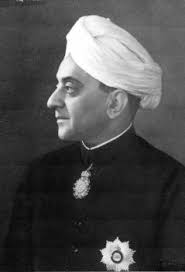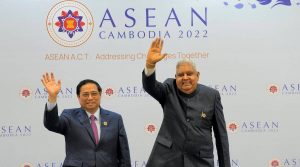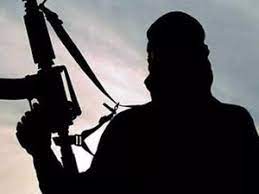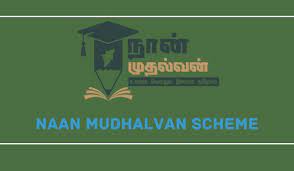Today Current Affairs: 15th November 2022 for UPSC IAS exams, State PSC exams, SSC CGL, State SSC, RRB, Railways, Banking Exam & IBPS, etc
Table of Contents
Methane Alert And Response System (MARS):

The Methane Alert and Response System (MARS) was launched at the COP27 to the United Nations Framework Convention on Climate Change in Sharm El-Sheikh, Egypt.
- Methane (CH4) accounts for a small portion of human-induced greenhouse gas (GHG) emissions compared to carbon dioxide (CO2), but it is 80 times more potent GHG than CO2.
- According to the Intergovernmental Panel on Climate Change (IPCC), the world must cut methane emissions by at least 30 % by 2030 – the goal of the Global Methane Pledge – to keep the 1.5°C temperature limit within reach.
- MARS is a part of global efforts to slow climate change by tackling global warming gas.
- The data-to-action platform was set up as part of the UNEP International Methane Emissions Observatory (IMEO) strategy to get policy-relevant data into the right hands for emissions mitigation.
- The system will be the first publicly available global system to connect methane detection to notification processes transparently.
- It will use state-of-the-art satellite data to identify significant emission events, notify relevant stakeholders, and support and track mitigation progress.
Eklavya Model Residential Schools (EMRS):

The Tribal Affairs Ministry intends to go ahead with its plan to build a new EMRS, despite concerns raised by a Parliamentary panel.
- EMRS will be constructed on 15 acres of land in all sub-districts with Scheduled Tribe (ST) populations of more than 20,000 people, accounting for at least 50% of the total
- Earlier this year, the Parliamentary Standing Committee on Social Justice and Empowerment suggested that this criterion be reviewed
- This is due to severe challenges in acquiring properties in several districts, particularly in forested or hilly places.
- This criterion would also deny scattered ST populations access to Eklavya schools.
- The Tribal Affairs Ministry started the EMRS in the year 1997-98 to impart quality education to ST children in remote areas.
- The schools focus not only on academic education but on the all-round development of the students from Class VI to XII .
- It has been agreed that by 2022, every block with more than 50% ST population and at least 20,000 tribal people will have an EMRS.
Sir CP Ramaswamy Iyer:

Senior BJP leader Prakash Javadekar and state education minister V Sivankutty traded allegations over erstwhile Travancore Diwan Sir CP Ramaswamy Iyer.
About Sir CP Ramaswamy Iyer:
- From 1936 to 1947, Sir Chetput Pattabhiraman Ramaswamy Iyer/Sir CP was the Diwan of the old Travancore princely state.
- His policies led to a massive uprising, the Punnapra-Vayalar revolt (Oct 1946) – a militant communist movement in the Princely State of Travancore.
- In 1947, Sir CP was in favour of an independent state of Travancore that would be open to the idea of signing a treaty with the Indian union. Communists were opposed to his move.
- The rage and discontent culminated in an assassination attempt on Sir CP, and he soon agreed to Travancore state’s entry to the Indian Union.
19th ASEAN-India Summit:

The Vice President of India attended the 19th ASEAN-India Summit in Phnom Penh, Cambodia.
Highlights of the Meeting
- India hailed the deep cultural, economic and civilizational ties that have existed between India and South East Asia from time immemorial and stated that the India-ASEAN relationship forms the central pillar of India’s ACT-EAST policy.
- India reiterated its support to ASEAN centrality in the Indo-Pacific.
- ASEAN and India adopted a joint statement announcing the elevation of the existing Strategic Partnership to Comprehensive Strategic Partnership.
- It reiterated the commitment to enhance India-ASEAN cooperation in various areas such as maritime activities, counter-terrorism, cyber security, digital economy, environment, science & technology, tourism, among other areas.
- It proposes expediting the review of ASEAN-India Trade in Goods Agreement (AITIGA) to make it more user-friendly, simple, and trade-facilitative.
- Both sides reaffirmed the importance of maintaining and promoting peace, stability, maritime safety and security, freedom of navigation and overflight in the Indo-Pacific region.
- As part of maintaining “ASEAN-Centrality”, the two sides reaffirmed the importance of deepening dialogue and coordination through ASEAN-led mechanisms including the ASEAN-India Summit, the East Asia Summit, the Post-Ministerial Conference with India (PMC+1), the ASEAN Regional Forum (ARF), the ASEAN Defense Ministers’ Meeting-Plus (ADMM-Plus), the Expanded ASEAN Maritime Forum (EAMF).
Association of Southeast Asian Nations:
- It is a regional grouping that promotes economic, political, and security cooperation.
- It was established in August 1967 in Bangkok, Thailand with the signing of the ASEAN Declaration (Bangkok Declaration) by the founding fathers of ASEAN, namely Indonesia, Malaysia, Philippines, Singapore and Thailand.
9th Ministerial Meeting Of The India-US Economic And Financial Partnership:

The 9th Ministerial meeting of the India-US Economic and Financial Partnership was held.
- The Indian delegation was led by the Union Minister for Finance & Corporate Affairs and the USA delegation was led by the Treasury Secretary.
Key Highlights of the Meet:
- Both countries shared the re-energized global efforts to increase climate ambition as well as respective domestic efforts to meet publicly expressed climate goals.
- In the context of the conflict in Ukraine, both discussed the current headwinds to the global macroeconomic outlook including increased commodity and energy prices as well as supply side disruptions, and reemphasized their commitment to the central role of multilateral cooperation in addressing these global macroeconomic challenges.
- They acknowledged the importance of working through MDBS to help India access and mobilize available financing to support development objectives, including climate action.
- Both plan to continue engaging on these and other global economic issues multilaterally and bilaterally.
- Both sides affirmed their commitment to debt sustainability, transparency in bilateral lending, and coordinating closely on extending fair and equal debt treatment to countries facing debt distress.
- Both reiterated commitment to step efforts to implement the G20 Common Framework for Debt Treatment in a predictable, timely, orderly and coordinated manner.
- Both agreed to mobilize USD 100 billion every year till 2025 from public and private sources for developing countries, in the context of meaningful mitigation actions and transparency on implementation.
- The countries also discussed mutual collaboration in sharing of information to tackle offshore tax evasion.
- The two sides will continue to engage in discussions relating to the Foreign Account Tax Compliance Act (FATCA) for sharing of financial account information.
16th Asian Conference On Diarrhoeal Disease And Nutrition:

Union Minister addressed 16th Asian Conference on Diarrhoeal Disease and Nutrition (ASCODD) at Kolkata. Delegates from India and other South East Asian countries, African countries, US, European countries joined the conference virtually.
- The theme of the ASCODD was “Prevention and control of cholera, typhoid and other enteric diseases in low and middle-income countries through community participation: beyond the SARS-CoV-2 pandemic”.
- The conference program focuses on the latest issues in enteric infections, nutrition, policy, and Practice including roadmap to end Cholera by 2030, Cholera vaccine development and rapid diagnostics, contemporary perspectives of antimicrobial resistance of enteric bacteria: new Initiatives and challenges, enteric bacterial infections, including Shigella spp, epidemiology, burden, and vaccines against other viral infections, including Hepatitis, lessons learned about diarrhoea research during the COVID pandemic.
- Indian initiatives under Digital India initiative such as Online Registration System, eHospital for hospital management, eSanjeevani telemedicine app were highlighted.
53rd International Film Festival Of India:

International Film Festival of India (IFFI) is set for its 53rd edition in 2022 in Goa
- The International Film Festival of India (IFFI), founded in 1952, is among Asia’s most prominent film festivals.
- It is held annually, currently in the state of Goa.
- Since 2004, starting from the 35th edition, the International Film Festival of India, became globally competitive, and moved to its permanent venue Goa, and is being held during the months of November and December of each year.
- The festival is conducted jointly by the Ministry of Information and Broadcasting, Directorate of Film Festivals and the Government of Goa.
- The idea of the International Film Festival of India is to celebrate films, the stories they tell and the people behind them.
National Workshop On Localization Of Sustainable Development Goals In Gram Panchayats:

A three-day National Workshop on Localization of Sustainable Development Goals in Gram Panchayats through Adopting Thematic Approaches: Theme 1: Poverty Free and Enhanced Livelihood Gram Panchayats is being organised during 14 – 16 November, 2022 at CIAL Convention Centre, Kochi, Kerala.
- The workshop aims to create awareness on the national level importance of addressing
- marginalisation – inclusion and access to basic services, social safety nets and protection systems – leveraging National Social Assistance Programme (NSAP), Mahatma Gandhi National Rural Employment Guarantee Scheme (MGNREGS) and National Rural Livelihoods Mission (NRLM) through Panchayats, and
- livelihoods – the role of Panchayats in addressing income inequality & poverty, eradicating extreme poverty and improving employment opportunities for poor, vulnerable and marginalized sections and
building resilience of vulnerable communities against the sudden shocks brought about by disasters and extreme climate events.
Sustainable Development Goals:
- Sustainable Development Goals adopted by United Nations came into effect from January 1, 2016.
- Ministry of Panchayat Raj, Government of India has adopted thematic approach to SDGs – It is approach to ensure ‘local action’ for achieving ‘global plan’.
- The approach aims to localise SDGs in rural areas through PRIs, especially Gram Panchayats by clubbing 17 ‘Goals’ into ‘9 Themes’.
- Appropriate policy decisions and revisions have followed resulting into revamping of Rashtriya Gram Swaraj Abhiyan (RGSA) and Gram Panchayat Development Plan (GPDP) Guidelines which smoothens the process of Localisation of Sustainable Development Goals (LSDGs) in Gram Panchayats.
75 Creative Minds Of Tomorrow:

75 youngsters, all in the age group 18 – 35, will get to attend the 53rd edition of International Film Festival of India as special guests, as part of the ‘75 Creative Minds of Tomorrow’ initiative of the Government.
- The 75 Creative Minds of Tomorrow initiative is the brainchild of Union Minister for Information and Broadcasting and Youth Affairs and Sports, Anurag Singh Thakur.
- The initiative aims to identify, encourage and nurture young creative talent in filmmaking, from the entire length and breadth of the country.
- The segment is an annual platform at the International Film Festival of India held in Goa, to identify, encourage and nurture young creative talents from across various aspects of filmmaking.
- The initiative is in its second year, having been launched in 2021 to mark the 75th year of India’s independence as part of the ‘Azadi Ka Amrit Mahotsav’ celebrations.
- The 75 creative minds will be shortlisted and selected on the basis of their submissions by an eminent jury, under the aegis of the National Film Development Corporation ahead of the 53rd edition of International Film Festival of India.
Indian Biological Data Bank : Faridabad

The government has for the first time set up a digitised repository where Indian researchers will store biological data from publicly funded research, reducing their dependency on American and European data banks.
- The digitised data will be stored on a four-petabyte supercomputer called ‘Brahm’.
- A petabyte equals 10,00,000 gigabytes (gb).
- The government has mandated that data from all publicly funded research should be stored in this central repository.
- So it will not only provide a platform to researchers to securely store their data within the country, it will also provide access to a large database of indigenous sequences for analyses.
- At present, most Indian researchers depend on the European Molecular Biology Laboratory (EMBL) and National Center for Biotechnology Information databases for storing the biological data.
- There are other smaller datasets available with some institutes, but those are not accessible to all. This will be the first national data repository, where the data will not only be submitted from across India but can be accessed by researchers from across India.
- The bio-bank, which cost about Rs 85 crore to set up, currently accepts neucleotide sequences the digitised genetic makeup of humans, plants, animals, and microbes.
- There are now 200 billion base pair data in the bio-bank, including 200 human genomes sequenced under the ‘1,000 Genome Project’, which is an international effort to map the genetic variations in people.
- The database also contains most of the 2.6 lakh Sars-Cov-2 genomes sequenced by the Indian Sars-CoV-2 Genomic Consortium (INSACOG).
- The database will also store the 25,000 sequences of mycobacterium tuberculosis.
- The database currently also stores the genomic sequences of crops such as rice, onion, tomatoes and mustard, among others.
- The database currently offers two mechanisms for data submission to researchers.
3rd Ministerial ‘No Money For Terror’ Conference:

3rd Ministerial Conference on Countering Financing of Terrorism – No Money for Terror to be held in New Delhi on November 18 and 19.
- It is organised by Union Ministry of Home Affairs.
- It aims to progress the discussions on combating terrorist financing held by the international community in the previous two Conferences in Paris (2018) and Melbourne (2019).
- It also intends to include discussions on technical, legal, regulatory and cooperation aspects of all facets of terrorism financing.
- It attempts to also set the pace for other high level official and political deliberations, focused on countering terrorist financing.
- The Conference intends to bring together representatives of 75 countries and international bodies for extended deliberations over two days.
- Discussions at the 3rd ‘No Money For Terror’ Conference will be focussed on global trends in terrorism and terrorist financing, use of formal and informal channels of funds for terrorism, emerging technologies and terrorist financing and requisite international co-operation to address related challenges.
Naan Mudhalvan scheme:

Corporates, industrial bodies and chambers of commerce are pitching in to play a crucial role in the Tamil Nadu government’s ‘Naan Mudhalvan’ scheme aimed at equipping college students with industry-relevant skills.
- It is an initiative of Tamil Nadu State government.
- Naan Mudhalvan platform aims to provide dynamic information for college students on courses and relevant information about industry specific skill offerings.
- This will enable the students of TamilNadu to get training in their chosen field of interest that will help them in achieving their career goals.
- The objective of this scheme is to identify potential training providers, to impart various skill trainings based on current industry gaps.
- Through this flagship program the students will be able to get trained and ensure they get jobs according to their skill sets.
International Forum On ‘Right To Drug-Free Childhood’:

The UN-backed conclave will open in Thiruvananthapuram on November 16, featuring prominent voices against drug abuse from India and abroad.
- It is organised by Fourth Wave Foundation (FWF) in partnership with United Nations Office on Drugs and Crime (UNODC) and World Federation Against Drugs (WFAD).
- Theme: ‘Children Matter-Right to a Drug-Free Childhood’ is the central theme of the meet.
- Fourth Wave Foundation’s initiative against substance abuse named ‘VENDA’ (No to Drugs), strongly advocates the ‘alternative pursuit’ model in Kerala on the lines of Icelandic Model (IM).
- Major activities of ‘VENDA’ include empowerment programmes for children, football training, summer camp, football tourney ‘Venda Cup’ and awareness classes for parents, teachers, counsellors, police and excise officers.
- ‘VENDA’ is active in districts that have a very high number of drug-addicted teens found by the National Action Plan for Drug Demand Reduction (NAPDDR) survey conducted by the Narcotic Control Bureau.
- The increasing relevance of the Icelandic Model (IM) of intervention in bringing teenagers affected by drug use disorders back to normal life through alternative pursuits will be a key topic of deliberations at the International Forum on ‘Right to Drug-free Childhood’.




